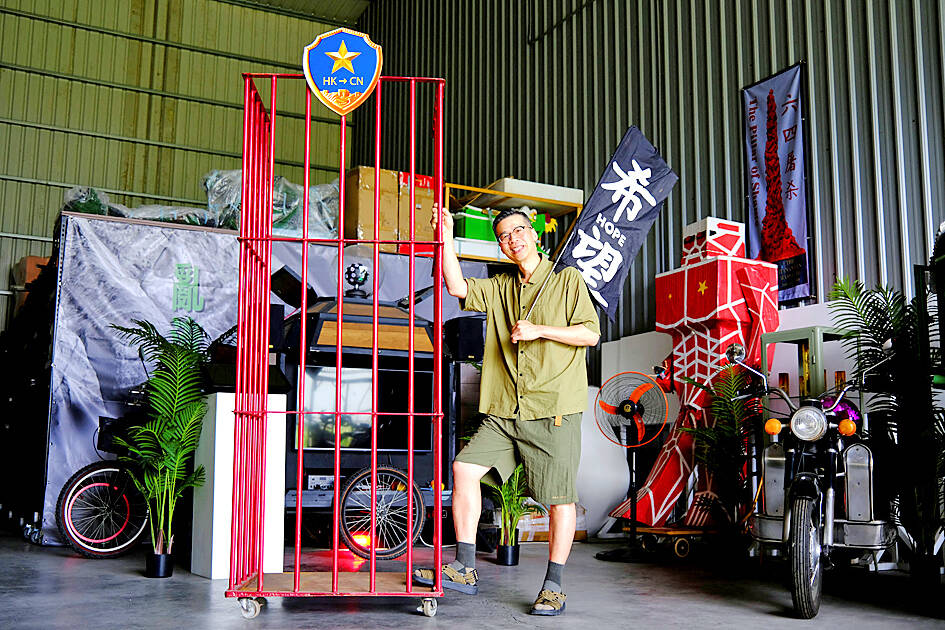Hong Kong artist Kacey Wong (黃國才) is striving to keep alive the memory of China’s June 4 crackdown on democracy demonstrators from his adopted home of Taiwan, as Chinese authorities again bar all public commemoration or discussion of the killings in 1989.
Wong, 54, said that June 4 has inspired him ever since he saw television news images of a lone Chinese man in a white shirt stand in front of a column of tanks, the moment that became the iconic image of the student and worker protests in and around Tiananmen Square in the heart of Beijing.
“I was totally in shock. I was like: ‘Wow, he’s so brave, I wouldn’t do that,’” Wong said in his studio in Taichung, recounting how he inadvertently glimpsed the footage when he was a university student in the US.

Photo: Fabian Hamacher, Reuters
“The message we are sending out to the Chinese Communist Party is: ‘We did not forget. We did not forget that 35 years ago, your party killed innocent citizens,’” he added.
Tanks and troops entered the square before dawn on June 4, 1989, opening fire on protesters.
The topic remains taboo in China and the Chinese Communist Party has never released a death toll, although rights groups and witnesses say the figure could run into the thousands.
In China-ruled Hong Kong, which once hosted large annual candlelight vigils for the event in a downtown park, authorities have prevented such gatherings in the past few years.
On Tuesday last week, Hong Kong police arrested six people for sedition under a new National Security Law enacted this year, stemming from what media said were online posts linked to June 4. Two more have been arrested since.
The last vigil in Hong Kong, in 2019, drew more than 180,000 people, organizers estimated.
Wong became involved in the commemorative efforts for June 4 a little over a decade ago, when he thought it was time for a different approach to preserving the memories.
“To commemorate is to defend and to treasure the dream of those who lost their lives, yearning for freedom and democracy,” he said, adding that he sees past events as “raw material” for protest movements.
Wong said that he left Hong Kong in 2021 for Taiwan, when wide-ranging arrests under a China-imposed law made him feel unsafe.
Among the Tiananmen-related artworks he has created are wax feathers molded from candles collected at previous June 4 vigils in Hong Kong.
Known as Feathers of the Yellow Bird, he said these symbolize “Operation Yellowbird,” a plan by Hong Kong rights advocates to help dissidents escape amid a massive hunt for participants by Chinese authorities after the 1989 crackdown.
Other works include an antique bicycle adorned with a black banner reading: “Don’t want to remember. Dare not forget,” that Wong would ride as performance art, handing flowers to passers-by to commemorate the dead.

A preclearance service to facilitate entry for people traveling to select airports in Japan would be available from Thursday next week to Feb. 25 at Taiwan Taoyuan International Airport, Taoyuan International Airport Corp (TIAC) said on Tuesday. The service was first made available to Taiwanese travelers throughout the winter vacation of 2024 and during the Lunar New Year holiday. In addition to flights to the Japanese cities of Hakodate, Asahikawa, Akita, Sendai, Niigata, Okayama, Takamatsu, Kumamoto and Kagoshima, the service would be available to travelers to Kobe and Oita. The service can be accessed by passengers of 15 flight routes operated by

MORE FALL: An investigation into one of Xi’s key cronies, part of a broader ‘anti-corruption’ drive, indicates that he might have a deep distrust in the military, an expert said China’s latest military purge underscores systemic risks in its shift from collective leadership to sole rule under Chinese President Xi Jinping (習近平), and could disrupt its chain of command and military capabilities, a national security official said yesterday. If decisionmaking within the Chinese Communist Party has become “irrational” under one-man rule, the Taiwan Strait and the regional situation must be approached with extreme caution, given unforeseen risks, they added. The anonymous official made the remarks as China’s Central Military Commission Vice Chairman Zhang Youxia (張又俠) and Joint Staff Department Chief of Staff Liu Zhenli (劉振立) were reportedly being investigated for suspected “serious

ENHANCING EFFICIENCY: The apron can accommodate 16 airplanes overnight at Taoyuan airport while work on the third runway continues, the transport minister said A new temporary overnight parking apron at Taiwan Taoyuan International Airport is to start operating on Friday next week to boost operational efficiency while the third runway is being constructed, the Ministry of Transportation and Communications said yesterday. The apron — one of the crucial projects in the construction of the third runway — can accommodate 16 aircraft overnight at the nation’s largest international airport, Minister of Transportation and Communications Chen Shih-kai (陳世凱) told reporters while inspecting the new facility yesterday morning. Aside from providing the airport operator with greater flexibility in aircraft parking during the third runway construction,

American climber Alex Honnold is to attempt a free climb of Taipei 101 today at 9am, with traffic closures around the skyscraper. To accommodate the climb attempt and filming, the Taipei Department of Transportation said traffic controls would be enforced around the Taipei 101 area. If weather conditions delay the climb, the restrictions would be pushed back to tomorrow. Traffic controls would be in place today from 7am to 11am around the Taipei 101 area, the department said. Songzhi Road would be fully closed in both directions between Songlian Road and Xinyi Road Sec 5, it said, adding that bidirectional traffic controls would